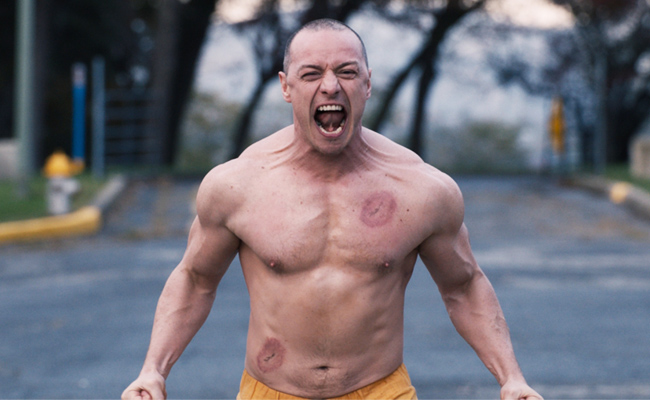
Glass sold the promise that it would be both a step forward for M. Night Shyamalan and a return to form. Shyamalan became a breakout director with The Sixth Sense in 1999, before turning in three or four execrable flops in a row culminating with After Earth in 2013, a $130 million dollar, critically panned post-apocalyptic adventure starring Jaden Smith. Yet Shyamalan impressively dodged irrelevance by making two well-received films with the indie small budget horror label Blumhouse in 2015 and 2016 — The Visit and Split. Maybe the key to his success was getting back to thinking small.
Shyamalan and Blumhouse are working together once again on Glass, a sequel to Unbreakable, Shyamalan’s Sixth Sense follow-up and his most cultishly popular film, which counts Quentin Tarantino among its notable fans. Glass is also a continuation of Split, so on paper it would promise to fuse old Shyamalan with Blumhouse Shyamalan, forever banishing “the guy who makes awful flops with Will Smith’s son” Shyamalan to a historical footnote.
Glass fuses seemingly disparate Shyamalan incarnations, but probably not in the way he would want. It’s a return to form, but not a step forward. It’s a ponderous exercise in self-justification that displays all of Shyamalan’s considerable filmmaking chops, coupled with his equal and opposite tendency to misread the room. He resurrects his most popular characters only to have them just kinda stand around while others argue about them.
I never loved Unbreakable as much as its devoted fans, but it was a promising ending. Bruce Willis’s David Dunn, everydad superhero, has come into his powers only to discover that Samuel L. Jackson’s brittle super genius, Mr. Glass, actually masterminded the deadly train accident of which Dunn was the only survivor — thereby revealing Dunn as a superhero and himself as Dunn’s supervillain nemesis. Ta-da! Classic Shyamalan twist. And yet… what did it accomplish, really? In a different movie that ending would be the beginning of a third act. It explained why the characters were but not who they were, and in retrospect, it feels like a harbinger.
Glass similarly fails to go forward. Instead of moving on from that Unbreakable ending revelation, where we find out superheroes and villains are real and live among us, Shyamalan spends virtually all of Glass’s running time wrestling with the question of… whether superheroes are real and live among us.
Sarah Paulson plays Dr. Ellie Staple, a government psychiatrist who has captured all three of the principles under one roof — Bruce Willis’ super strong/telepathic vigilante, James McAvoy’s multiple personality serial killer, and Samuel L. Jackson’s weak-boned egghead. The key to capturing them, it turns out, is that McAvoy’s Beast can’t handle bright lights and Dunn’s kryptonite is water. Hmm, are these superhero rules or kitty cat rules? Anyway, Staple says she’s been given three days to convince them that they don’t have special powers, a process that takes up most of the film’s running time.
Why she would need to do this or what purpose it would serve are never adequately articulated. If Dunn believes he’s not super, does he cease being a vigilante? If McAvoy’s “Beast” stops believing he has super strength, does he stop being a serial killer? And would that even matter? He’s already in prison for killing people. If he admits he doesn’t have special powers would we let him out? Who cares?
Yet through it all, Shyamalan still, frustratingly, displays an artisan’s mastery of the process — scenes beautifully composed and blocked, grounded in place and time and with gradually escalating tension — even as the narrative charges off hopelessly up its own butt.
In speech after speech, Sarah Paulson’s character essentially debates the film’s own dramatic conceit. Are superheroes real? Well, that’s sort of… up to the storyteller, isn’t it? It’s debating the self-evident.
When inevitably we find out that superheroes are, indeed, real, in this narrative, there isn’t much time left for Shyamalan to actually do anything with them. Mr. Glass obnoxiously explains superhero tropes to us as they happen and Shyamalan makes a belated case for superheroes’ social value.
Wouldn’t it be great if superheroes were real? Why can’t people believe in magic anymore?
Divorced of a specific religious message (which might be Shyamalan’s true calling, if he’d allow it), this weird paean to the supernatural feels almost like an ode to the power of movie magic, a self-justification. And as anyone who sat through Lady In the Water can attest, there’s nothing quite like being constantly hectored about not suspending your disbelief even as you’re already suspending it. It’s a tautological narrative. “Why should we believe in magic? You should believe in magic because magic is real.”
Shyamalan is an acclaimed director, but seems to want to be treated like a cult leader, and Glass is mostly a lengthy ode to itself. Given the chance to make a superhero movie, Shyamalan has instead made a movie where characters tell us about superheroes.
‘Glass’ opens nationwide on Friday, January 17. Vince Mancini is on Twitter. You can find his archive of reviews here.






